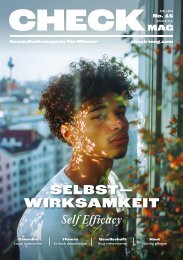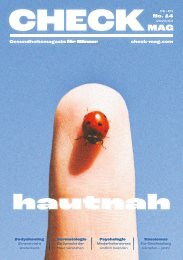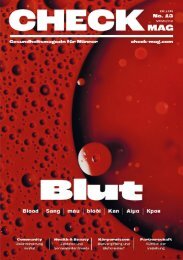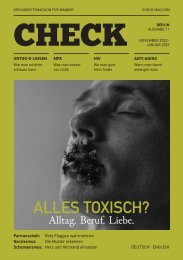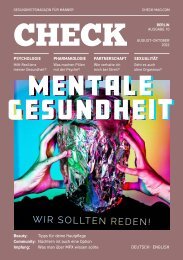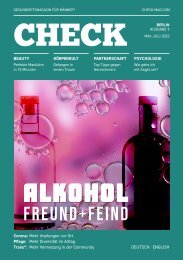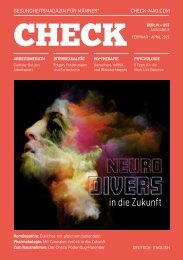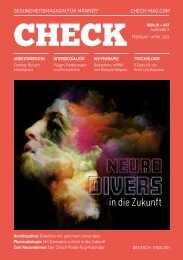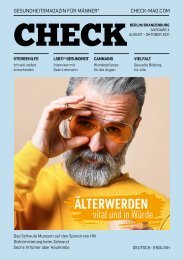CHECK Magazin - Gesundheitsmagazin für Männer No.17
Wer geht nicht mit vollem Kopf zu Bett? Die einen können ihre Tagesgeschäfte im Traum verarbeiten, die anderen liegen wach und grübeln. Manche behelfen sich mit Schlafmitteln, um das nötige Maß an Erholung zu erreichen, schieben damit aber oft die Probleme nur auf die lange Bank. In dieser Ausgabe wollen wir daher genauer hinsehen und fragen: Was macht der Schlaf und wie können wir ihn verbessern?
Wer geht nicht mit vollem Kopf zu Bett? Die einen können ihre Tagesgeschäfte im Traum verarbeiten, die anderen liegen wach und grübeln. Manche behelfen sich mit Schlafmitteln, um das nötige Maß an Erholung zu erreichen, schieben damit aber oft die Probleme nur auf die lange Bank. In dieser Ausgabe wollen wir daher genauer hinsehen und fragen: Was macht der Schlaf und wie können wir ihn verbessern?
Sie wollen auch ein ePaper? Erhöhen Sie die Reichweite Ihrer Titel.
YUMPU macht aus Druck-PDFs automatisch weboptimierte ePaper, die Google liebt.
Pharmacology<br />
Sleeping is one of our basic needs and an<br />
indispensable part of our biorhythm. A good balance<br />
between waking and sleeping phases is essential for<br />
physical and mental health. But sleeping properly<br />
is easier said than done, because our sleep phases<br />
also suffer from our stressful, light- and noisepolluted<br />
environment. If sleep does not provide<br />
the necessary mental recovery in the long term and<br />
does not give the body the opportunity to regenerate<br />
sufficiently, people become ill.<br />
Sleep hygiene offers a solution here.<br />
Pop a pill, sleep, done<br />
An entire industry has developed around our sleep<br />
problems: preparations with herbal active ingredients<br />
in drugstores and pharmacies, prescription<br />
drugs in various strengths, meditation courses, sleep<br />
apps, special pillows and mattresses, sound emitters<br />
and fragrance dispensers ... the non-sleeping<br />
consumer is spoiled for choice. Is it all about money?<br />
Should you go straight for the meds? Who better to<br />
answer these questions than a young entrepreneur<br />
whose day always has too few hours and for whom<br />
“sleeping in” is a foreign concept – my boss Nico.<br />
Alex: When asked if they slept well, most<br />
people can only answer with a yawn and<br />
bags under their eyes. Why?<br />
Nico: There are many triggers for sleep<br />
disorders, from overstimulation and<br />
modern media, stress and pressure to<br />
perform at work and/or in the family,<br />
to unusual working hours, emotional problems<br />
and certain illnesses. So if you are looking for<br />
help, you should first try to determine the type of<br />
sleep disorder which you have, and what’s causing<br />
it. Where a glass of Brandy used to help, people<br />
nowadays prefer to borrow a few tablets from aunt<br />
Hilda because they help so well. While alcohol<br />
is widely acknowledged as a bad problem solver,<br />
prescription drug abuse is still accepted. This is<br />
especially dangerous in the case of sleeping pills<br />
and tranquillisers for two reasons: problems are<br />
postponed, but the causes of the sleep problems are<br />
rarely eliminated, and issues such as dependency,<br />
addiction potential and effects are trivialised.<br />
“Problems are postponed, but the<br />
causes of the sleep problems are<br />
rarely eliminated, and issues such<br />
as dependency, addiction potential<br />
and side effects are trivialised.”<br />
There are only a few over-the-counter<br />
preparations of chemically synthesised<br />
substances available. When and how<br />
should they be used?<br />
Nico: Synthetic sleeping pills have a<br />
high addictive potential, which is why<br />
all but one group of substances require<br />
a prescription. These substances<br />
should not be taken for longer than 4 weeks<br />
and should be avoided in combination with<br />
alcohol, coke, and amphetamines. All of these<br />
substances alter the natural sleep profile with<br />
their sleep- promoting effect and thus become<br />
part of the problem. In the case of insomnia,<br />
non- benzodiazepine antagonists (or Z-substances),<br />
which are now considered the drugs of<br />
choice, are often the only options, making a visit to<br />
the doctor unavoidable. Hypnotics have a calming,<br />
anxiolytic, anticonvulsant and sleep-promoting<br />
effect in varying degrees, but many of them can<br />
only be broken down slowly, which often leads to<br />
the famous “hangover” the next morning.<br />
In self-medication, there are some first-generation<br />
antihistamines that are now on the market as<br />
sleeping pills. The substances were developed to<br />
dampen allergy symptoms, but this effect fell short<br />
of the side effect of causing severe drowsiness. In<br />
older people, too short a sleep phase or taking<br />
the drug for longer than 2 weeks can also lead to<br />
balance problems, drowsiness and confusion. This<br />
increases the risk of falls. Attention must also be<br />
paid to interactions when taking other medications<br />
at the same time.<br />
33 <strong>CHECK</strong> MAG #17





